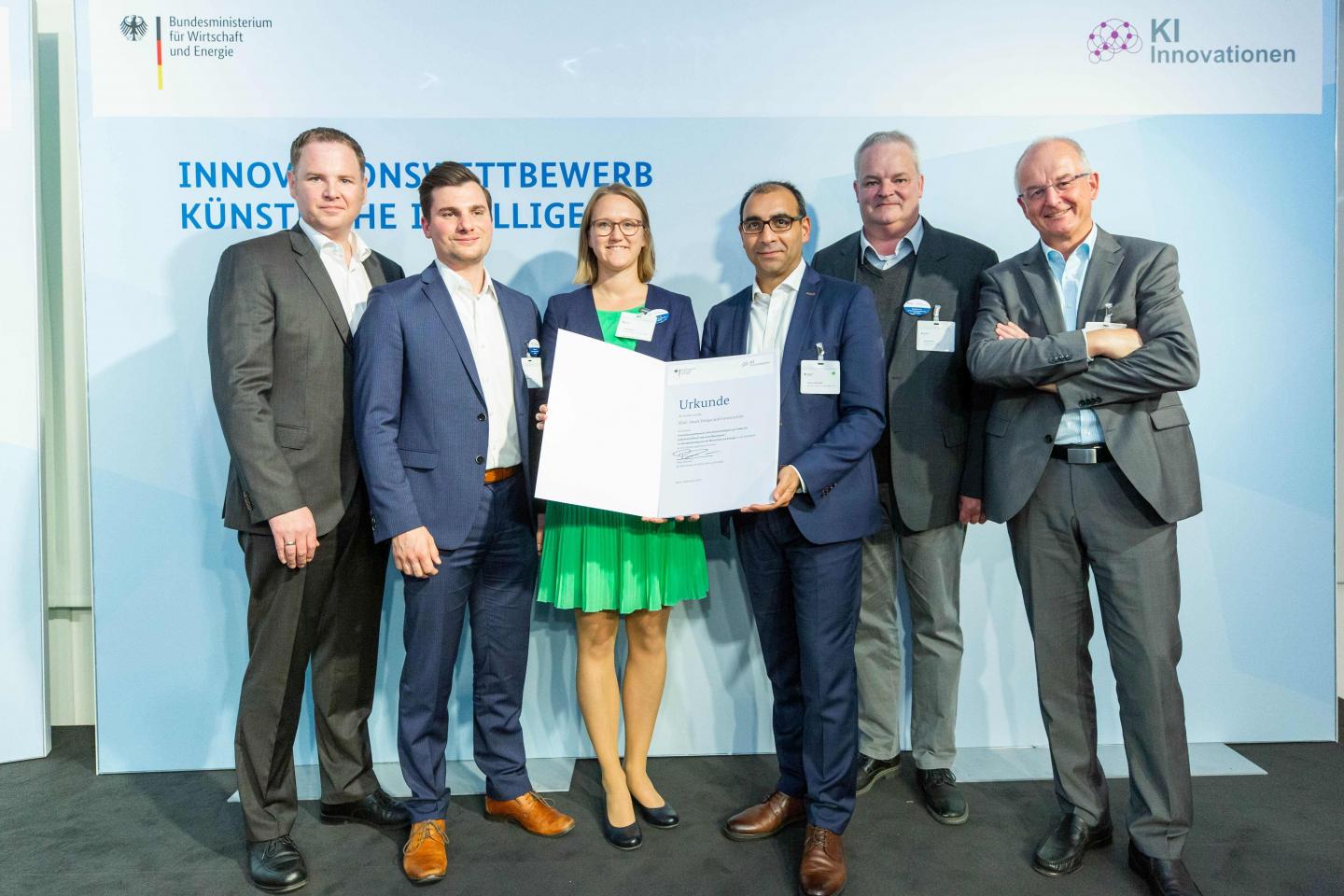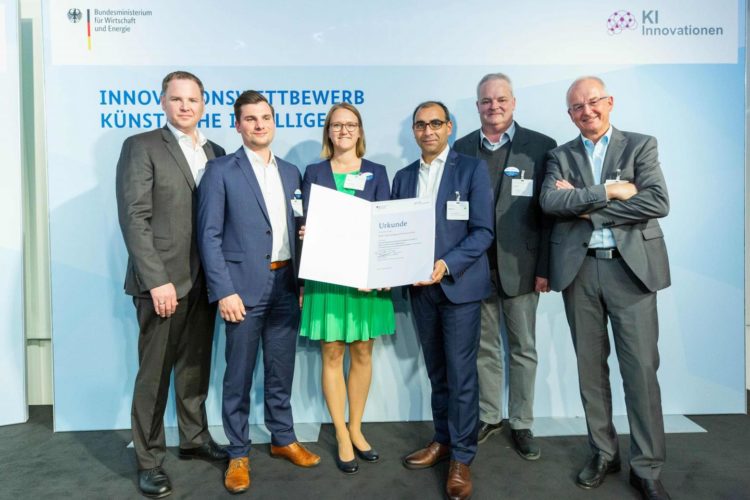KIT and partners win innovation competition with an AI platform for the construction sector — BMWi funds SDaC project with EUR 6.4 million

Credit: (Photo: BMWi/Bildkraftwerk Kurc)
Karlsruhe Institute of Technology (KIT) successfully participated in the innovation competition on the use of artificial intelligence (AI) launched by the Federal Ministry for Economic Affairs and Energy (BMWi). The KIT-coordinated research project SDaC – Smart Design and Construction will be funded. With the help of the new AI platform, the way will be paved for digital and interconnected data management in the construction sector. BMWi will co-fund the EUR-9-million-project for a duration of three years.
“Artificial intelligence is a powerful tool that will determine our future life in many ways. With the project funded now, we will help the construction sector prepare for the complex challenges in future,” says Professor Holger Hanselka, President of KIT. “The success of KIT in the innovation competition of BMWi confirms that scientists of KIT are among the central trendsetters in AI in Germany. I am very happy about this.”
The research project “SDaC – Smart Design and Construction” succeeded in the two-stage innovation competition “Artificial Intelligence as a Driver of Economically Relevant Ecosystems” of BMWi. From more than 130 consortia of all branches, 16 were granted funding, including SDaC and two other projects with KIT participation.
“The construction sector is one of the most important branches in Germany. It provides the necessary infrastructure for all areas of society,” says Professor Shervin Haghsheno, Head of the KIT Institute for Technology and Management in Construction and Scientific Director of the SDaC research project. “With the development and test of AI applications within our platform approach, we would like to create a new ecosystem for innovative products and services and to contribute to saving resources and enhancing efficiency in the construction added value chain.”
The SDaC consortium consists of more than 40 project partners from science and practice. The project is aimed at developing a platform as well as concrete applications of AI methods for the digital transformation of the construction sector. AI is to help explore new pathways to cope with the high fragmentation in the construction sector and improve data management. It is planned to make heterogeneous and decentralized data machine-readable and to link them across borders of businesses. This will give rise to new data-driven applications and business models.
Artificial Intelligence in the Construction Sector
The construction sector is facing major challenges of high relevance to society. The need for affordable living space, quick use of investments in the transport infrastructure and for the energy transition, and the lack of specialists in the construction sector require new processes and applications to enhance the sector’s productivity and competitiveness. According to studies, only 4 to 5 percent of construction companies are presently using digital models (building information modeling). The resulting media disruptions and lacking standards of documentation lead to long search times, manual processes for data processing, and too much information that cannot be used again. This was the point of departure of a first case study carried out by the project partner digitales bauen GmbH in the area of building planning. The study covered the use of AI to automatically analyze sections of a building and identify similarities to ongoing plannings of buildings. The planner is enabled to reuse previously obtained information, workload is reduced, and he/she can concentrate on creative aspects of his/her work. In a similar way, AI might also be used for the planning and implementation of production. Additionally, AI can help derive the basic data for prognosis and decision.
The planned platform will interconnect and compare the metadata of building projects across businesses. In this way, valid prognoses will also be possible for small and medium-sized companies. For this, partners will provide data from more than 16,500 construction projects. Technology partners with the corresponding expertise will develop the platform and applications. Four institutes of KIT will participate in the project to sustainably establish data- and human-centered business models in the construction sector. Cooperation partners will support commercialization and transfer of applications and the platform to practice. Setup of the platform will be funded by the BMWi with EUR 6.4 million for a duration of three years. The project partners will provide additional funds in the amount of 2.6 million euros. Apart from the four KIT institutes (TMB, KSRI, EnTechnon, IAI), CyberForum e.V., Deutscher Beton- und Bautechnik-Verein e.V. (DBV), digitales bauen GmbH, FARO Europe GmbH & Co KG, Fraunhofer ISST, Goldbeck GmbH, Gemeinschaft für Überwachung im Bauwesen e.V. (GÜB), IGP Completing Projects AG, Metis Systems AG, and Steuer Tiefbau GmbH are among the project partners.
Other Successful AI Projects in the Innovation Competition
Apart from SDaC, two other research projects with KIT participation were among the winners of the BMWi innovation competition. The Service-Meister project is an AI-based service ecosystem for technical services in the era of Industry 4.0. The project coordinated by eco-Verband der Internetwirtschaft e.V. (Association of the Internet Industry) is aimed at developing a platform for digital advising of less specialized staff to help them cope with the maintenance and repair of complex machines. In addition, KIT is partner of the FabOS project of the Fraunhofer Society that focuses on a specialized, open, and secure operation system for the highly flexible factory of tomorrow that is capable of change.
###
More about the competition:
https:/
Photo caption: The SDaC research project was one of the winners of the Innovation Competition for the Use of Artificial Intelligence launched by the BMWi. From left to right: Dr. Christoph Sievering (GÜB), Maximilian Schütz (Goldbeck GmbH), Svenja Oprach (KIT), Prof. Dr. Shervin Haghsheno (KIT), Georg Müller (digitales bauen GmbH), Prof. Dr. Gerhard Satzger (KIT). (Photo: BMWi/Bildkraftwerk Kurc)
More about the KIT Information · Systems · Technologies Center:
http://www.
Press contact: Martin Heidelberger, Redakteur/Pressereferent, Tel.: +49 721 608-21169, [email protected]
Being „The Research University in the Helmholtz Association”, KIT creates and imparts knowledge for the society and the environment. It is the objective to make significant contributions to the global challenges in the fields of energy, mobility and information. For this, about 9,300 employees cooperate in a broad range of disciplines in natural sciences, engineering sciences, economics, and the humanities and social sciences. KIT prepares its 25,100 students for responsible tasks in society, industry, and science by offering research-based study programs. Innovation efforts at KIT build a bridge between important scientific findings and their application for the benefit of society, economic prosperity, and the preservation of our natural basis of life.
Media Contact
Monika Landgraf
[email protected]
49-721-608-21105
Original Source
https:/





